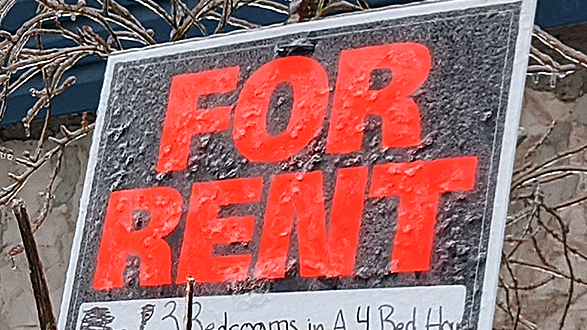Halifax’s risky rental market continues to weigh on most vulnerable groups
CMHC report suggests overall rent increase of 3.8 per cent across HRM

caption
A 'for rent' sign outside a property on Jubilee Road in Halifax.Renting an apartment in Halifax has never been more difficult than it is now, particularly for those with a low income.
The Canadian Mortgage and Housing Corporation (CMHC) released its annual report on Jan. 15. In its survey of rental properties of the Halifax census metropolitan area (CMA), the CMHC indicated an overall rental vacancy rate of one per cent.
This data places Halifax CMA below Toronto, Vancouver, Montreal and Calgary.
Housing support worker Leigh MacLean said those with the lowest income are hit the hardest. She works at Welcome Housing and Support Services, which helps people find and keep affordable housing. Related stories
“We’re turning away five to 10 people a week because we don’t have the capacity to serve them, and those are people that are either homeless or at imminent risk for homelessness,” she said.
Welcome Housing runs the Halifax Housing Help program. Many of those who turn to the organization for support are on income assistance (IA) with the provincial government.
The cost of shelter
Those who qualify for income assistance (IA) in Nova Scotia receive $586 per month under the Standard Housing Rate for one person. If they’re working and earn between $500 and $750, the recipient keeps $437.50 plus 50 per cent of any money earned over $500.
If a recipient makes $500 per month and gets $586 from IA, they will net a total of $1,023.50. The average rent for a one-bedroom residence in the Halifax CMA is $959 per month. After paying rent, they would be left with $64 for food, transportation and any other essentials.
Organizations like MacLean’s have seen an increase in demand for their services as the rental market has become more precarious.
“We’ve been noticing the increase for a couple years now, but it’s definitely peaked. We’re at a point where we have the least number of affordable units and the most people looking for affordable units right now,” she said.
The demand for help
The CMHC report suggests that the new apartment supply is not coming onto the rental market fast enough to offset the increased demand for rental properties. One potential reason for the slow completion time is the size of the noted 4,000 projects currently under construction in the Halifax CMA.
The report did suggest however, that these larger projects have a significant impact on supply over a short period when they eventually are completed.
But those using housing support services often don’t have the time to wait for new projects.
“Right now, with the point we’re at, I have 200-plus individuals on my case load and there are maybe a couple of units becoming available at any time,” MacLean said. “So, when someone is calling you saying, ‘I’m going to be homeless in two weeks,’ I can’t in good conscience tell them to leave their apartment.”
MacLean said she’s seen some cases in which a tenant’s rent jumped from $600 to $1,300 a few months after leaving.
“They’re in a spot right now but they’re going to be sleeping outdoors if they leave their apartments,” she said. “When we have no shelter beds, the landlords have free range of what they can do to people because there is no exit.”

caption
Photo illustration of Nova Scotia lease documents.The right to know
Tenants need to know their rights, said Stephen Wentzell, a programming co-ordinator for the Nova Scotia Public Interest Research Group (NSPIRG).
“The rental crisis in Halifax is leading to more tenants’ rights to be violated as landlords exploit an unregulated housing market with limited options of recourse,” he said.
With such a low vacancy rate, he said, tenants might be hesitant to turn down a place that may not be safe or accessible.
Wentzell and the NSPIRG organized an information session on tenants’ rights on Wednesday in the Dalhousie Student Union Building. It was open to everyone, not just students.
Wentzell said Halifax’s diverse demographic motivated him to pursue this idea.
“Because there are varying tenants’ rights from other provinces and countries, it’s important for folks to know both their rights as a tenant and their rights as a landlord in this province,” he said. “That’s the primary reason for organizing the workshop, is to inform people and help preserve their rights in a precarious housing market.”
Wentzell said the housing market presents a complex problem, and no single solution will be able to fix the issue.
“We need a livable minimum wage, increases to income assistance shelter allowances, rent control legislation and some regulations for short-term rentals to combat this crisis,” he said.
MacLean agrees there’s a lot still to do to help people find and remain in affordable housing.
“At this point in the game a lot of people know their rights, but we can’t enforce them. That whole structure needs a revamp,” she said.
About the author

Benjamin Elliott
Ben Elliott is a reporter for the Signal at King's College in Halifax. He got his HBA in Communication Studies from the University of Waterloo...